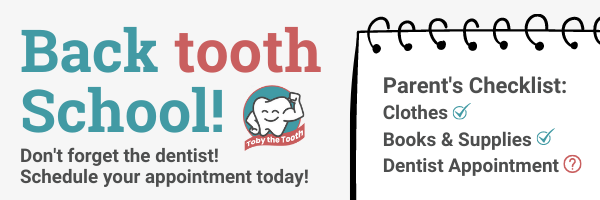apartmentApply to Osborn Pointe! Learn more about this 55+ community in Phoenix - NOW LEASING!

Start the school year with a great big smile; check out these back to school tips from the Strong Teeth Strong Kid campaign, complete with Arizona dentist and AZ dental coverage resources!
Clothes ✔ Books and supplies ✔ Hair ✔ Dentist Appointment ?
Uh Oh! Don't forget the check-up! STSK has you covered; schedule an appointment today!
No one should go without dental care; make sure your child is covered. Check out this list of dental coverage available to Arizonans of all ages.
Looking for the right dental clinic for you? Check out this list of clinics across Tribal areas and throughout Maricopa county.
Dental Clinics available to American Indian / Alaska Native Adults and Children
Dental Clinics available to all children and adults in Maricopa County
1. Schedule a dental appointment: Dental cleaning, sealant or fluoride treatment. Get your child established with a Pediatric dentist and make follow up appointments. The more visits the more comfort and confidence your child will have. Here's a tip: try playing dentist so your kiddo is familiar with what happens during their visit! See more resources for preparing for your child's annual dental check-ups.
2. Pack tooth friendly lunches for school: Your child can enjoy a fun healthy lunch for school that's also tooth friendly. Watch this short video that makes lunch fun and good for a child’s teeth and overall health.
3. Make brushing fun: Brushing twice a day is the goal. These tricks can encourage kids to brush more:
Native American Connections and the Arizona Advisory Council on Indian Health Care launched the Strong Teeth, Strong Kid Campaign in November 2019, coinciding with Native American Heritage Month. The Strong Teeth Strong Kid Campaign raises awareness of the importance of dental milestones for American Indian children ages 0-5 years. The Campaign S-milestones will help ensure children grow up with totally AHHH-SOME Teeth!
To learn more about the campaign, visit us at strongteethstrongkid.org.
Become an Oral Health Partner!
Email tobythetooth@nativeconnections.org or call (602) 254-3247 to connect with our team and get involved!

Our traditions are the foundation of our organization - explore, learn, and utilize resources available for all.

Get the support you need with health, housing, and community services available at Native American Connections.

Your support changes lives and builds healthy communities. Find ways to get involved.

A "chronically homeless" individual is defined to mean a homeless individual with a disability who lives either in a place not meant for human habitation, a safe haven, or in an emergency shelter or in an institutional care facility if the individual has been living in the facility for fewer than ninety (90) days and had been living in a place not meant for human habitation, a safe haven or in an emergency shelter immediately before entering the institutional care facility. In order to meet the ‘‘chronically homeless’’ definition, the individual also must have been living as described above continuously for at least twelve (12) months or on at least four (4) separate occasions in the last three (3) years, where the combined occasions total a length of time of at least twelve (12) months. Each period separating the occasions must include at least seven (7) nights of living in a situation other than a place not meant for human habitation, in an emergency shelter or in a safe haven.
Federal nondiscrimination laws define a person with a disability to include any (1) individual with a physical or mental impairment that substantially limits one or more major life activities; (2) individual with a record of such impairment; or (3) individual who is regarded as having such an impairment. In general, a physical or mental impairment includes, but is not limited to, examples of conditions such as orthopedic, visual, speech and hearing impairments, cerebral palsy, autism, epilepsy, muscular dystrophy, multiple sclerosis, cancer, heart disease, diabetes, Human Immunodeficiency Virus (HIV), developmental disabilities, mental illness, drug addiction, and alcoholism.